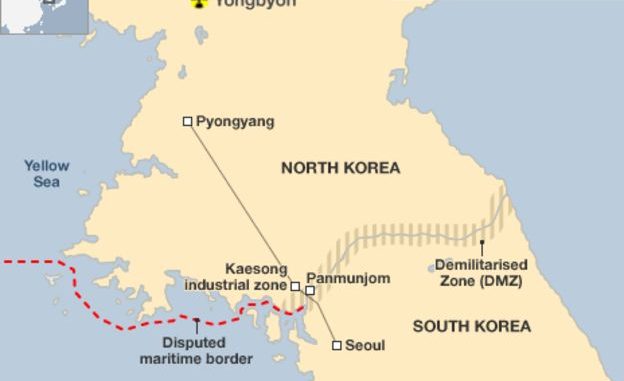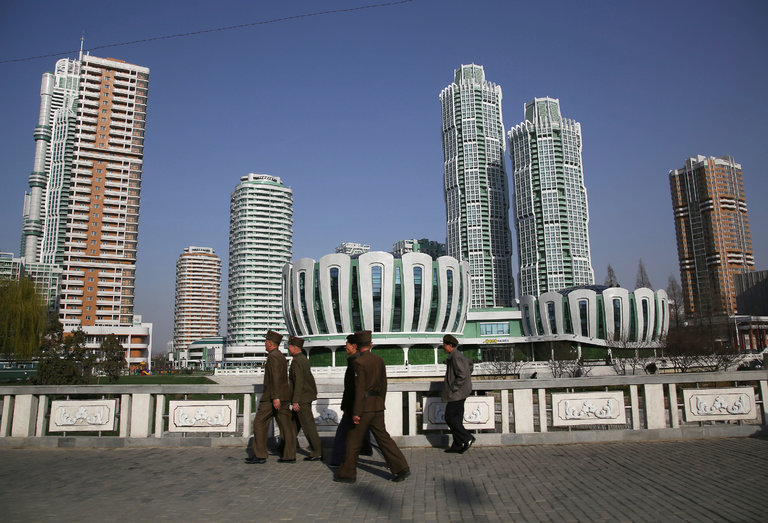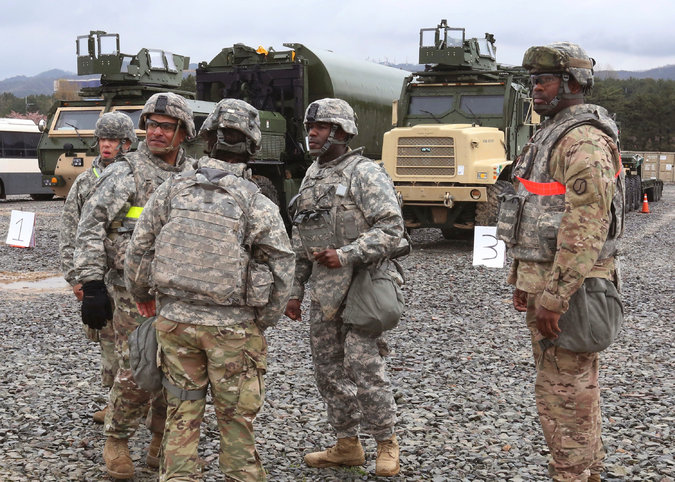
North Korea keeps most of its crucial military assets in tunnels — US & South Korean military planners have not located them all, making retaliation unavoidable. That would mean catastrophic devastation to South Korea, especially Seoul. The capital city — home to 10 million people and surrounded by satellite cities with another 10 million residents — lies within range of North Korean artillery, rockets and short-range missiles amassed along the border. There are also 200,000 American civilians, as well as 28,500 United States troops, living in South Korea, and their neighborhoods would probably be among the first targets of any North Korean retaliation. Top: Map showing Seoul proximity to North Korea border. Below: Pyongyang, North Korean capital. Twitter posts by Trump on Tuesday contributed to concern in South Korea about the possibility of pre-emptive strikes.
“Reacting to worries and conjecture spreading in South Korea of a possible pre-emptive US military strike on nuclear-armed North Korea,
the government sought to reassure citizens on Tuesday there would be no such attack without its consent.
Statements of reassurance from government officials came as a leading presidential candidate warned
that no foreign countries, including the United States, should bring war to the Korean Peninsula.
During the last week, anxiety among South Koreans has intensified
that the Trump administration would answer the North’s messages of nuclear belligerence with a military strike.
The anxieties were fed by Trump’s willingness to use force,
as seen in his [ clueless ] missile attack on Syria and the redeployment of US warships near the Korean Peninsula;
as well as his reckless and ignorant ] impatience with China over what he views as its [ legitimate ] reluctance to pressure North Korea’s leader, Kim Jong-un.
Trump added to the worries on Tuesday with Twitter messages declaring that if the Chinese would not help, “we will solve the problem without them!”
Although officials in South Korea have said the US would never attack the North without first consulting the South Korean government,
the confluence of events has revived fears of such a possibility.
“The United States makes it clear that it will not take a new policy or measure without consultations with us,”
Cho June-hyuck, a spokesman for the South Korean Foreign Ministry, said on Tuesday when asked by reporters about the rumors.
Moon Jae-in, leader of the main opposition Democratic Party, in a Facebook post that was widely cited in South Korean news media on Tuesday,
issued his own warning against the possibility of an American pre-emptive strike carried out unilaterally.
“The safety of South Korea is as important as that of the United States,” he said.
“There should never be a pre-emptive strike without South Korean consent.”
SOUTH KOREAN ELECTION
The center-left Moon is one of the two leading contenders, along with the center-right leader, Ahn Cheol-soo,
for the May 9 presidential election to choose the successor to former President Park Geun-hye.
Ms. Park, who was impeached by Parliament in December, was formally ousted in a Constitutional Court ruling in March.
Prime Minister Hwang Kyo-ahn is serving as the acting president.
“Neighboring countries are taking advantage of the absence of a president in South Korea
to try to exclude us and handle issues on the Korean Peninsula according to their own understanding,” Moon said,
without blaming the Trump administration by name.
American soldiers during a joint exercise with the South in Pohang, South Korea, on Tuesday. South Koreans consider the United States their most important ally in deterring the North.
THE STRATEGIC CALCULUS
Although South Koreans consider the US their most important ally in deterring North Korea,
they remain deeply wary of any American moves that they fear will raise tensions and even rekindle war.
The Korean Peninsula remains technically at war because the 1950-53 Korean War was halted by an armistice, not a peace treaty.
The United States and South Korea would together win any war against North Korea —
THE IDEA OF A “WINNER” IN ANY SUCH ARMED CONFLICT IS COMPLETELY INSANE,
AND IT’S DISTURBING THAT SUCH A CLAUSE WOULD EVEN APPEAR IN THE NYTimes —
but many [ correctly ] fear catastrophic devastation to South Korea, especially Seoul.
The capital city — home to 10 million people and surrounded by satellite cities with another 10 million residents —
lies within the range of North Korean artillery, rockets and short-range missiles amassed along the border.
In 1994, not long after the nuclear crisis first flared with North Korea,
President Bill Clinton considered launching an attack on the North’s main nuclear complex in Yongbyon north of Pyongyang, the capital,
according to the South Korean president at the time, Kim Young-sam.
Panic swept through South Korea, with people stocking up on food.
Kim later said he had personally protested to Clinton, persuading Washington to drop the plan to strike Yongbyon.
After conducting five nuclear tests since 2006, North Korea is now widely believed to have several to as many as a dozen nuclear weapons,
making a pre-emptive strike far riskier than it was in 1994.
The North is also one of the world’s largest owners of chemical and biological weapons and apparently has no qualms in using them,
as in the Feb 13 assassination in Malaysia of Kim Jong-nam, the estranged half brother of the North Korean leader Kim Jong-un.
Malaysia has said Kim Jong-nam was killed by the nerve agent VX.
Since Kim Jong-un took power five years ago, North Korea has conducted three nuclear tests and nearly 50 ballistic missile tests.
And in his New Year’s Day speech, Kim said his country was in the “final stage” of preparing for its first test of an intercontinental ballistic missile.
Trump retorted at the time: “It won’t happen!”
Defense analysts said there were too many constraints for the US to launch a pre-emptive strike against North Korea without expecting a major retaliation.
North Korea keeps most of its crucial military assets in tunnels,
and it remains unclear whether the United States and South Korean military planners have located them all.
There are also 200,000 American civilians, as well as 28,500 United States troops, living in South Korea,
and their neighborhoods would probably be among the first targets of any North Korean retaliation.
On Tuesday, North Korea’s main state-run newspaper, Rodong Sinmun, [ correctly ] said that
if the US tried a pre-emptive strike, it would be “as foolish as putting its own neck on the chopping block.”
In another sign North Korea has no intention of forsaking nuclear arms,
top North Korean officials in Pyongyang gathered on Tuesday,
the fifth anniversary of Kim’s election as leader of the ruling Workers’ Party,
and vowed to uphold his policy of strengthening the North’s nuclear arsenal, the state news media reported.
Also on Tuesday, Ri Su-yong, an 82-year-old Politburo member, former foreign minister, and adviser and childhood mentor to Kim, was given another powerful position in Parliament.
Last year, Ri told Chinese officials that North Korea’s nuclear weapons expansion was “permanent.”
SOUTH KOREAN ELECTION – REDUX
With less than one month left before the presidential election in the South, how to deal with North Korea has become a dominant campaign issue.
Ahn, presidential candidate of the centre-right People’s Party, has recently surged in popularity to rival Moon in a neck-and-neck race.
Many conservative voters who were disappointed by Park’s conservative camp are supporting Ahn,
whom they consider tougher on North Korea than Moon, political analysts said.
Ahn said that if elected, he would honor the contentious decision by Ms. Park’s government to allow the US to deploy an advanced antimissile defense system in the South.
China has vehemently opposed the deployment, calling it a threat to its own security,
and South Korean shops, movies and TV dramas have been boycotted by many Chinese in recent months.
Moon, who has said South Korea should learn to “say no to the Americans,” vowed to review the deployment if elected.
On Tuesday, Moon said if North Korea froze its nuclear weapons program and returned to negotiations,
the deployment of the so-called Terminal High Altitude Area Defense, or THAAD, could be suspended.
But if North Korea conducts its sixth nuclear test and advances its nuclear weapons program, he said, the deployment will likely become “inevitable.””
BOOM !!!
BOOM !!!
BOOM !!!
Source: South Korea Seeks to Assure Citizens U.S. Won’t Strike North Pre-emptively – The New York Times

